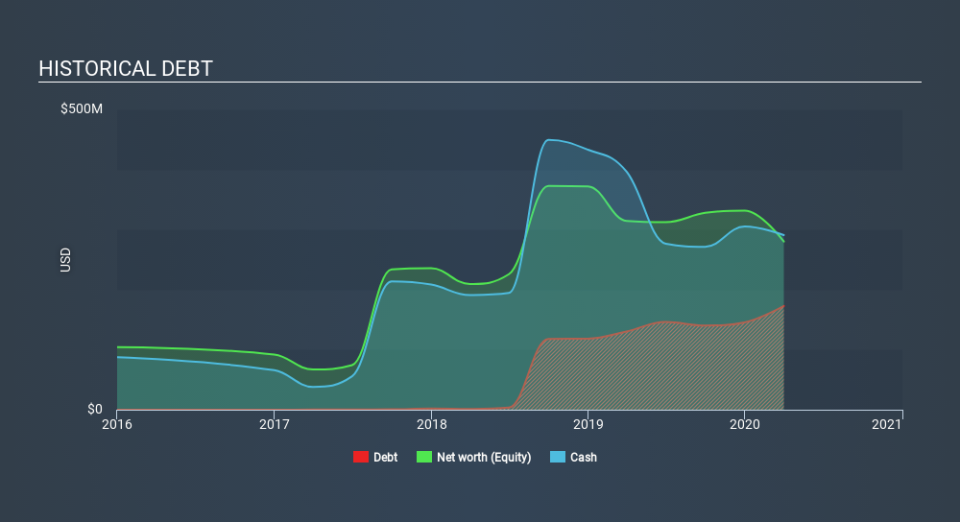Is Redfin (NASDAQ:RDFN) Using Debt Sensibly?

The external fund manager backed by Berkshire Hathaway's Charlie Munger, Li Lu, makes no bones about it when he says 'The biggest investment risk is not the volatility of prices, but whether you will suffer a permanent loss of capital. When we think about how risky a company is, we always like to look at its use of debt, since debt overload can lead to ruin. Importantly, Redfin Corporation (NASDAQ:RDFN) does carry debt. But the more important question is: how much risk is that debt creating?
When Is Debt Dangerous?
Debt and other liabilities become risky for a business when it cannot easily fulfill those obligations, either with free cash flow or by raising capital at an attractive price. Part and parcel of capitalism is the process of 'creative destruction' where failed businesses are mercilessly liquidated by their bankers. While that is not too common, we often do see indebted companies permanently diluting shareholders because lenders force them to raise capital at a distressed price. Having said that, the most common situation is where a company manages its debt reasonably well - and to its own advantage. When we think about a company's use of debt, we first look at cash and debt together.
View our latest analysis for Redfin
How Much Debt Does Redfin Carry?
You can click the graphic below for the historical numbers, but it shows that as of March 2020 Redfin had US$172.8m of debt, an increase on US$130.3m, over one year. But it also has US$290.8m in cash to offset that, meaning it has US$118.0m net cash.
A Look At Redfin's Liabilities
We can see from the most recent balance sheet that Redfin had liabilities of US$136.1m falling due within a year, and liabilities of US$178.5m due beyond that. On the other hand, it had cash of US$290.8m and US$22.0m worth of receivables due within a year. So these liquid assets roughly match the total liabilities.
Having regard to Redfin's size, it seems that its liquid assets are well balanced with its total liabilities. So while it's hard to imagine that the US$3.98b company is struggling for cash, we still think it's worth monitoring its balance sheet. Despite its noteworthy liabilities, Redfin boasts net cash, so it's fair to say it does not have a heavy debt load! There's no doubt that we learn most about debt from the balance sheet. But it is future earnings, more than anything, that will determine Redfin's ability to maintain a healthy balance sheet going forward. So if you want to see what the professionals think, you might find this free report on analyst profit forecasts to be interesting.
Over 12 months, Redfin reported revenue of US$861m, which is a gain of 66%, although it did not report any earnings before interest and tax. Shareholders probably have their fingers crossed that it can grow its way to profits.
So How Risky Is Redfin?
We have no doubt that loss making companies are, in general, riskier than profitable ones. And we do note that Redfin had negative earnings before interest and tax (EBIT), over the last year. And over the same period it saw negative free cash outflow of US$120m and booked a US$74m accounting loss. But at least it has US$118.0m on the balance sheet to spend on growth, near-term. With very solid revenue growth in the last year, Redfin may be on a path to profitability. By investing before those profits, shareholders take on more risk in the hope of bigger rewards. When analysing debt levels, the balance sheet is the obvious place to start. However, not all investment risk resides within the balance sheet - far from it. Take risks, for example - Redfin has 3 warning signs we think you should be aware of.
Of course, if you're the type of investor who prefers buying stocks without the burden of debt, then don't hesitate to discover our exclusive list of net cash growth stocks, today.
This article by Simply Wall St is general in nature. It does not constitute a recommendation to buy or sell any stock, and does not take account of your objectives, or your financial situation. We aim to bring you long-term focused analysis driven by fundamental data. Note that our analysis may not factor in the latest price-sensitive company announcements or qualitative material. Simply Wall St has no position in any stocks mentioned.
Have feedback on this article? Concerned about the content? Get in touch with us directly. Alternatively, email editorial-team@simplywallst.com.

 Yahoo News
Yahoo News 

